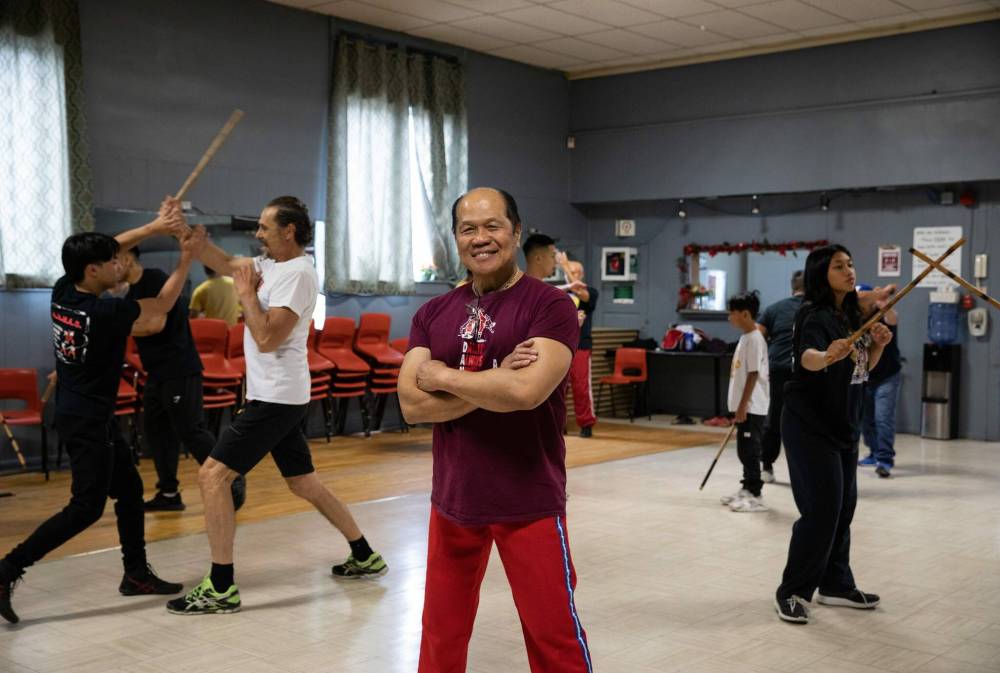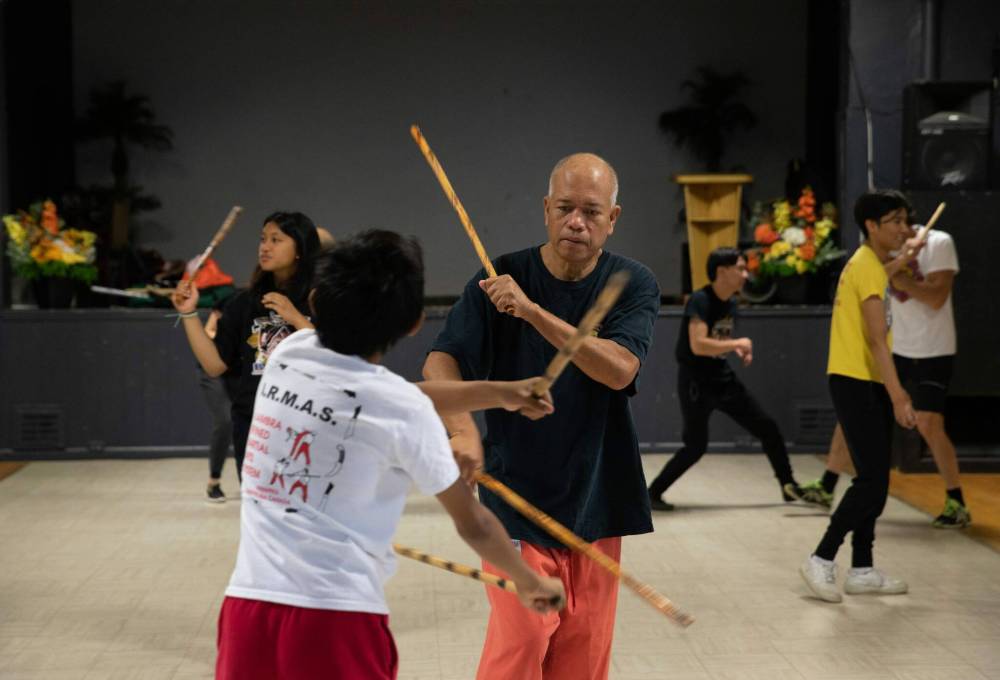Filipino martial arts a family affair
Winnipeg school was first in Canada to teach arnis and sikaran
Advertisement
Read this article for free:
or
Already have an account? Log in here »
To continue reading, please subscribe:
Monthly Digital Subscription
$0 for the first 4 weeks*
- Enjoy unlimited reading on winnipegfreepress.com
- Read the E-Edition, our digital replica newspaper
- Access News Break, our award-winning app
- Play interactive puzzles
*No charge for 4 weeks then price increases to the regular rate of $19.00 plus GST every four weeks. Offer available to new and qualified returning subscribers only. Cancel any time.
Monthly Digital Subscription
$4.75/week*
- Enjoy unlimited reading on winnipegfreepress.com
- Read the E-Edition, our digital replica newspaper
- Access News Break, our award-winning app
- Play interactive puzzles
*Billed as $19 plus GST every four weeks. Cancel any time.
To continue reading, please subscribe:
Add Free Press access to your Brandon Sun subscription for only an additional
$1 for the first 4 weeks*
*Your next subscription payment will increase by $1.00 and you will be charged $16.99 plus GST for four weeks. After four weeks, your payment will increase to $23.99 plus GST every four weeks.
Read unlimited articles for free today:
or
Already have an account? Log in here »
Hey there, time traveller!
This article was published 22/06/2023 (892 days ago), so information in it may no longer be current.
Outlawed in the Philippines by Spanish invaders more than 500 years ago, arnis is a form of martial arts created by the Indigenous population of the Southeast Asian archipelago. Arnis was then forced to evolve into a more benign form of entertainment, with sticks taking the place of weapons.
Today, while the art has returned to its combat roots, the sticks remain. Winnipeg students learn under the guidance of Dante Solomon Alambra, 72, who has been practising arnis and sikaran, another Filipino martial art, for 67 years.
“People continued the training, making it like a game,” Alambra says. “Some of them used it like a folk dance so it wouldn’t be detected by Spanish authorities. It was practised long before the coming of the Spaniards in 1521.”

JESSICA LEE / WINNIPEG FREE PRESS
Dante Alambra, 72, at the Filipino Seniors Hall where he teaches sikaran and arnis
Alambra was five when his father started training him.
“My first teacher was my dad, Damian Alambra. I learned arnis first — it is different to sikaran. Arnis is stickfighting and sikaran is footfighting,” Alambra explains.
Damian Alambra, a second lietenant in the Philippines army and a veteran of the Second World War, had learned the skill from the elders in his community. He not only taught his children how to fight but also instructed soldiers in the army.
“My father believed that there would be a war every 20 to 25 years,” Alambra says. “He taught me the art of self-defence so I could teach my siblings. That’s how I got interested in learning it.”
Alambra moved from the Philippines to Winnipeg in October 1977 with his wife, Clamancia. The couple have two children, Charissa and Dastin, both of whom are in their 40s, and six grandchildren.
He started his school, Sikaran-Arnis School of Martial Arts, just a few days after he arrived in the city. Although they are two separate forms, Alambra combined the footfighting of the former with the stickfighting of the latter.
“I was the one who started sikaran-arnis here; I was the one who brought it to Canada,” he says. “I wanted to introduce it to the people here and I was very lucky, because people accepted it.
“I even joined up with other martial arts schools such as taekwondo and kickboxing. Even though we didn’t have a formal organization at that time, they accepted me as part of the martial arts circle in Winnipeg.”
He accepts students from as young as five and his oldest student is 84 — although he stresses there is no age limit when it comes to training.
It’s a family affair. Alambra has taught his children, grandchildren and wife, although he admits “she only practised a little bit.” His brother Carlo often instructs students, as does Charissa; Dastin has won a number of competitions.

JESSICA LEE / WINNIPEG FREE PRESS
Arnis attracts intergenerational interest, but numbers have declined since the pandemic.
“Before the pandemic we travelled all over the place to attend tournaments,” he says. “My son is a five-time world champion in arnis and sikaran.”
Alambra himself has organized various local and international tournaments, the last of which was in 2014 at the RBC Convention Centre.
His school, which was flourishing before the pandemic, currently only has between 15 to 20 students. He used to teach full time. But as student numbers have dropped, he now works as a security guard for a casino, teaching in the evenings and on weekends.
“I am trying to make it bigger and have more students,” he says. “I have to do it very slow; I am still working. The income of my school right now is not very good, not like before.
“If I can make it more prosperous, I am very willing to go back to teaching full time.”
For more information on the school and the martial arts program visit wfp.to/sikaran. Classes are held on Mondays and Wednesdays from 5 to 6.20 p.m. and on Saturdays from 10 to 11 a.m. at 49 Euclid Ave.
av.kitching@winnipegfreepress.com

AV Kitching is an arts and life writer at the Free Press. She has been a journalist for more than two decades and has worked across three continents writing about people, travel, food, and fashion. Read more about AV.
Every piece of reporting AV produces is reviewed by an editing team before it is posted online or published in print — part of the Free Press‘s tradition, since 1872, of producing reliable independent journalism. Read more about Free Press’s history and mandate, and learn how our newsroom operates.
Our newsroom depends on a growing audience of readers to power our journalism. If you are not a paid reader, please consider becoming a subscriber.
Our newsroom depends on its audience of readers to power our journalism. Thank you for your support.


